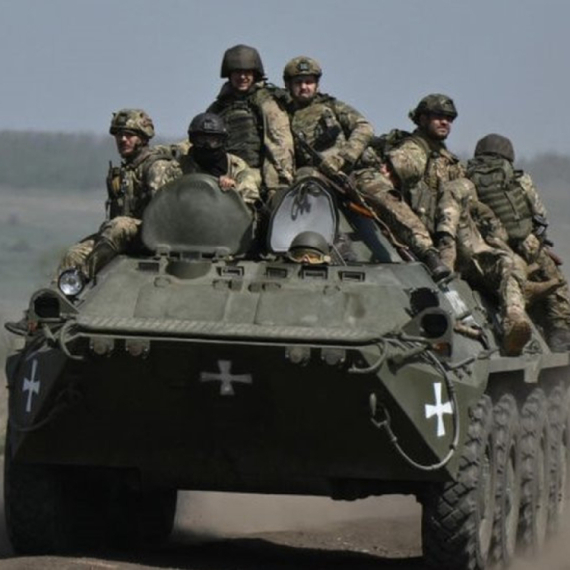U.S. lawmakers reject attempt to cut Libya mission funding
A divided U.S. House of Representatives has sent a mixed message to President Barack Obama on U.S. military involvement in Libya.
Saturday, 25.06.2011.
13:55

A divided U.S. House of Representatives has sent a mixed message to President Barack Obama on U.S. military involvement in Libya. Lawmakers handed Obama a symbolic setback by refusing to authorize the U.S. involvement in Libya for one year. But in a second vote, the House stopped short of cutting off funds for the Libya involvement in what was seen as a symbolic victory for the White House. U.S. lawmakers reject attempt to cut Libya mission funding During Friday’s debate, it was clear that objections to the U.S. military involvement in Libya spanned the ideological spectrum. Many Republicans are upset with Obama for refusing to abide by the 1973 War Powers Resolution, which requires the president to seek congressional approval for the use of U.S. military forces involved in hostilities abroad within 60 days. House Speaker John Boehner supported a Republican proposal to cut most of the funding for U.S. involvement in the Libyan operation. The funding restriction would have cut off the use of drone attacks in Libya but continued funding support missions including search and rescue, intelligence, surveillance and refueling. “I support the removal of the Libyan regime. I support the president’s authorities as commander in chief," said Boehner. "But when the president chooses to challenge the powers of the Congress, I as speaker of this House will defend the constitutional authority of the legislature.” Republicans were joined in the effort by a few anti-war Democrats who are tired of the military commitments in Afghanistan, Iraq and now Libya. “Mr. Speaker, I have to tell you I have been all over this country and I haven’t had a single person come up to me to tell me, ‘you know, Dennis, what America needs is another war.’ The last thing we need is to be voting to go to war," said Congressman Dennis Kucinich is a Democrat from Ohio. "There are plenty of reasons to oppose the war in Libya.” Eighty-nine Republicans joined forces with most members of the Democratic minority in the House to reject the effort to cut most of the funding for U.S. involvement in Libya by a vote of 238 opposed to 180 in favor. In the earlier vote, the House rejected an attempt to give the U.S. president the authority to continue military operations in Libya for another year by a margin of 295 to 123. Seventy Democrats joined most Republicans in refusing to authorize the U.S. role in support of NATO. Democrat Steny Hoyer of Maryland argued that the Republican-led effort to eliminate funds for the Libya operation would have sent the wrong message around the world. “The message will go to Muammar Gaddafi. The message will go to our NATO allies," said Hoyer. "The message will go to every nation of the world that America does not keep faith with its allies. America must lead. We must not equivocate.” At the State Department, Secretary of State Hillary Clinton praised lawmakers for rejecting the proposal that would have cut most of the funding for the Libya mission. “We need to stand together across party lines and across both branches of government with the Libyan people and with our friends and allies and against Gaddafi,” Clinton said. White House Spokesman Jay Carney expressed disappointment in the earlier House vote against authorizing the Libya mission, and said it was not the time for Congress to send mixed signals on Libya. Next week, the focus shifts to the Democratically-controlled Senate, which is expected to be more receptive to the president’s policy on Libya. Democrat John Kerry and Republican John McCain have co-sponsored a resolution that would authorize limited U.S. military involvement in Libya for one year. The Obama administration says it would welcome approval of that resolution, which will be taken up by the Senate Foreign Relations Committee and eventually by the full Senate. Barack Obama (Beta)
U.S. lawmakers reject attempt to cut Libya mission funding
During Friday’s debate, it was clear that objections to the U.S. military involvement in Libya spanned the ideological spectrum.Many Republicans are upset with Obama for refusing to abide by the 1973 War Powers Resolution, which requires the president to seek congressional approval for the use of U.S. military forces involved in hostilities abroad within 60 days.
House Speaker John Boehner supported a Republican proposal to cut most of the funding for U.S. involvement in the Libyan operation. The funding restriction would have cut off the use of drone attacks in Libya but continued funding support missions including search and rescue, intelligence, surveillance and refueling.
“I support the removal of the Libyan regime. I support the president’s authorities as commander in chief," said Boehner. "But when the president chooses to challenge the powers of the Congress, I as speaker of this House will defend the constitutional authority of the legislature.”
Republicans were joined in the effort by a few anti-war Democrats who are tired of the military commitments in Afghanistan, Iraq and now Libya.
“Mr. Speaker, I have to tell you I have been all over this country and I haven’t had a single person come up to me to tell me, ‘you know, Dennis, what America needs is another war.’ The last thing we need is to be voting to go to war," said Congressman Dennis Kucinich is a Democrat from Ohio. "There are plenty of reasons to oppose the war in Libya.”
Eighty-nine Republicans joined forces with most members of the Democratic minority in the House to reject the effort to cut most of the funding for U.S. involvement in Libya by a vote of 238 opposed to 180 in favor.
In the earlier vote, the House rejected an attempt to give the U.S. president the authority to continue military operations in Libya for another year by a margin of 295 to 123. Seventy Democrats joined most Republicans in refusing to authorize the U.S. role in support of NATO.
Democrat Steny Hoyer of Maryland argued that the Republican-led effort to eliminate funds for the Libya operation would have sent the wrong message around the world.
“The message will go to Muammar Gaddafi. The message will go to our NATO allies," said Hoyer. "The message will go to every nation of the world that America does not keep faith with its allies. America must lead. We must not equivocate.”
At the State Department, Secretary of State Hillary Clinton praised lawmakers for rejecting the proposal that would have cut most of the funding for the Libya mission.
“We need to stand together across party lines and across both branches of government with the Libyan people and with our friends and allies and against Gaddafi,” Clinton said.
White House Spokesman Jay Carney expressed disappointment in the earlier House vote against authorizing the Libya mission, and said it was not the time for Congress to send mixed signals on Libya.
Next week, the focus shifts to the Democratically-controlled Senate, which is expected to be more receptive to the president’s policy on Libya.
Democrat John Kerry and Republican John McCain have co-sponsored a resolution that would authorize limited U.S. military involvement in Libya for one year. The Obama administration says it would welcome approval of that resolution, which will be taken up by the Senate Foreign Relations Committee and eventually by the full Senate.

















































Komentari 1
Pogledaj komentare